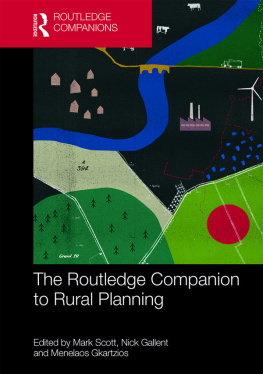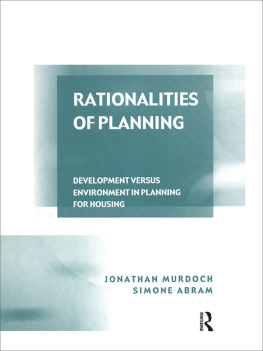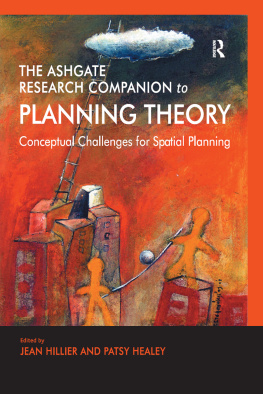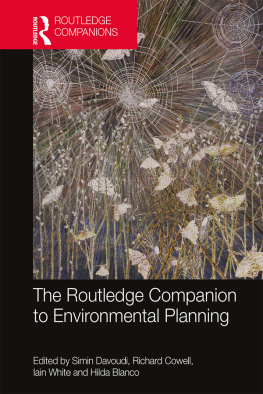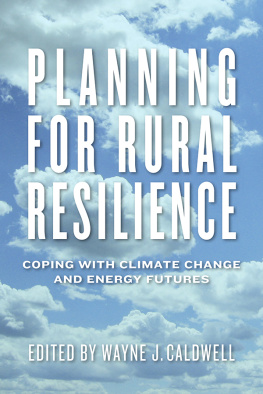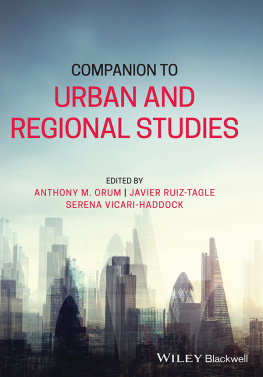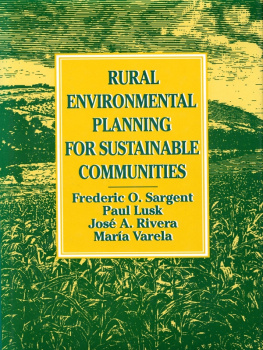
The Routledge Companion to Rural Planning
The Routledge Companion to Rural Planning provides a critical account and state of the art review of rural planning in the early years of the twenty-first century.
Looking across different international experiences from Europe, North America and Australasia to the transition and emerging economies, including BRIC and former communist states it aims to develop new conceptual propositions and theoretical insights, supported by detailed case studies and reviews of available data. The Companion gives coverage to emerging topics in the field and seeks to position rural planning in the broader context of global challenges: climate change, the loss of biodiversity, food and energy security, and low carbon futures. It also looks at old, established questions in new ways: at social and spatial justice, place shaping, economic development, and environmental and landscape management. Planning in the twenty-first century must grapple not only with the challenges presented by cities and urban concentration, but also grasp the opportunities and understand the risks arising from rural change and restructuring. Rural areas are diverse and dynamic. This Companion attempts to capture and analyse at least some of this diversity, fostering a dialogue on likely and possible rural futures between a global community of rural planning researchers.
Primarily intended for scholars and graduate students across a range of disciplines, such as planning, rural geography, rural sociology, agricultural studies, development studies, environmental studies and countryside management, this book will prove to be an invaluable and up-to-date resource.
Mark Scott is Professor of Planning at University College Dublin, Ireland.
Nick Gallent is Professor of Housing and Planning and Head of the Bartlett School of Planning, University College London, UK.
Menelaos Gkartzios is Senior Lecturer in Planning and Development at Newcastle Universitys Centre for Rural Economy, UK.
The Routledge Companion
to Rural Planning
Edited by Mark Scott, Nick Gallent and
Menelaos Gkartzios

First published 2019
by Routledge
2 Park Square, Milton Park, Abingdon, Oxon OX14 4RN
and by Routledge
52 Vanderbilt Avenue, New York, NY 10017
Routledge is an imprint of the Taylor & Francis Group, an informa business
2019 selection and editorial matter, Mark Scott, Nick Gallent and Menelaos Gkartzios; individual chapters, the contributors
The right of Mark Scott, Nick Gallent and Menelaos Gkartzios to be identified as the authors of the editorial material, and of the authors for their individual chapters, has been asserted in accordance with sections 77 and 78 of the Copyright, Designs and Patents Act 1988.
All rights reserved. No part of this book may be reprinted or reproduced or utilised in any form or by any electronic, mechanical, or other means, now known or hereafter invented, including photocopying and recording, or in any information storage or retrieval system, without permission in writing from the publishers.
Trademark notice : Product or corporate names may be trademarks or registered trademarks, and are used only for identification and explanation without intent to infringe.
British Library Cataloguing-in-Publication Data
A catalogue record for this book is available from the British Library
Library of Congress Cataloging-in-Publication Data
A catalog record has been requested for this book
ISBN: 978-1-138-10405-1 (hbk)
ISBN: 978-1-315-10237-5 (ebk)
Typeset in Bembo
by Swales & Willis Ltd, Exeter, Devon, UK
Loka Ashwood is an assistant professor at Auburn University. She earned her PhD in sociology from the University of Wisconsin-Madison. She is author of the book For-Profit Democracy: Why the Government is Losing the Trust of Rural America (forthcoming).
Stuart Auckland is the programme coordinator for community health development at the Centre for Rural Health, University of Tasmania. He has extensive experience in rural community development and has undertaken a range of community based projects and participatory research initiatives in both the natural resource management and rural health sectors.
Jo Barton is a senior lecturer in sports and exercise science at the University of Essex. Her research expertise focuses on the relationship between the environment and human health, specifically green exercise. She is interested in how nature-based interventions can be used to facilitate physical activity, enhance physiological and mental health and initiate behaviour change.
Jonathan Bell is policy manager at Northern Ireland Environment Link (a leading environmental NGO in Northern Ireland). Jonathan has extensive experience in environmental research, teaching, policy and practice. His research interests cover environmental policy and governance, sustainable development and rural planning.
Michael M. Bell is Vilas Distinguished Achievement Professor of Community and Environmental Sociology and director of the Center for Integrated Agricultural Systems at the University of Wisconsin-Madison. He is the author or editor of ten books, three of which have won national awards. His most recent book, City of the Good: Nature, Religion, and the Ancient Search for What Is Right , was published in 2018.
Mark Bevan is senior research fellow in the Centre for Housing Policy, University of York. He has maintained a keen interest in housing issues in rural areas throughout his career, including work on the private rented sector, the role of social housing, the housing and support needs of older people, the impact of second and holiday homes on rural communities and rural homelessness.
Bettina B. Bock is a professor at the rural sociology group at Wageningen University and the cultural geography group at Groningen University, both in the Netherlands. Most of her research regards questions around inclusive rural development, the quality of life in depopulating rural areas, and interrelation between urbanisation and rural marginalisation. She is the editor-in-chief of Sociologia Ruralis .
Andrew Butt is associate professor in sustainability and urban planning in the School of Global, Urban and Social Studies (GUSS) and the Centre for Urban Research (CUR) at RMIT, Australia. His current research and supervision is in the area of land use change and planning policy associated with regional Australia, food systems and peri-urban development.
Lus Camarero is professor at the National Distance Education University (Madrid, Spain). His research work is focused in the analysis of rural living conditions, demographic processes, gender inequalities, labour markets, and the role that spatial mobilities play in the transformation of social structure in rural areas.
Paul Cowie is a faculty research fellow working in the Centre for Rural Economy at Newcastle University. His research interests are in rural innovation and entrepreneurship particularly in the non-traditional economic sectors. He is also interested in the use of theatre as research and engagement method.
Julie Crawshaw is lecturer in material culture at Northumbria University. She has a background in visual arts and holds a PhD in planning from University of Manchester. Her research interests are classical and feminist pragmatism, the role of art and anthropology in rural and urban planning, and arts administration and cultural management.
Andreas Culora is a postgraduate researcher in the School of Geography and Environment at Loughborough University. His main research interests relate to housing in multiple occupation, housing markets and population change, socio-economic inequalities and housing, internal and international migration, and studentification.
Next page
